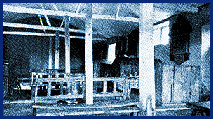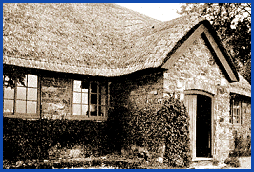
Religion in Wales
Church and chapel
The resilience of puritanism
Despite persecution and the exodus of many Welsh Quakers, nonconformity
in the early eighteenth century clung on in small communities.
Old puritanism had survived, and was particularly resilient in
Breconshire where Congregationalists and Baptists were the most
common sects, often meeting in scattered groups at private houses.
The Toleration Act of 1689 allowed dissenters to worship
freely in licensed meeting houses. Even though their members
were still excluded from universities and public office, the
dissenting sects had some protection in law. Their members were
a small but influential minority in society, particularly in
anglicised south Wales.
The first chapels in Powys
Among the earliest chapels or meeting houses in Powys were Maesyronnen
chapel (above) in Glasbury parish, and the Quaker Meeting
House at The Pales near  Llandegley (right), both examples
being in remote locations.
Llandegley (right), both examples
being in remote locations.
In the early period in the eighteenth century there was a great
surge in the publishing and distribution of Welsh bibles and
tracts, and translated works like Bunyan’s Pilgrim’s
Progress. The Welsh Trust and the Society for the
Promotion of Christian Knowledge worked hard to distribute
subsidised works, and a Welsh bible became a family treasure,
even among many poor labouring families. This not only encouraged
literacy, but prepared the ground for a grass-roots response
to Methodism.
There are 8 pages in this sequence. Use the box links below to view the other pages.